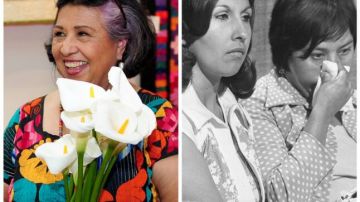Gloria Molina Remembered as a Trailblazing Latina in Los Angeles Politics
Trailblazer Gloria Molina made history in Los Angeles not once, or twice, but three times when she was the first Latina elected to the California state Assembly in 1982; later the first Latina elected to the Los Angeles City Council in in 1987; and in 1991, she was the first Latina elected to the Los

Photos: A Plaza de Cultura y Artes/Los Angeles Times Photographic Collection at the UCLA Library/ Gloria Molina, on the left, and Dolores Madrigal at news conference
Trailblazer Gloria Molina made history in Los Angeles not once, or twice, but three times when she was the first Latina elected to the California state Assembly in 1982; later the first Latina elected to the Los Angeles City Council in in 1987; and in 1991, she was the first Latina elected to the Los Angeles County Board of Supervisors. The Mexican American political pioneer died Sunday, May 14, at the age of 74 after a three-year battle with terminal cancer. She began her work as a political activist participating in the Chicano Moratorium as a student East Los Angeles College. Molina then went on to be aid in the founding of the local chapter of Comisión Femenil, a nonprofit dedicated to improving the lives of Latinas.
“We are so proud that Gloria will be remembered in history for the impact she made on Los Angeles, the state, and country as a Chicana activist, State Assemblymember, Los Angeles City Councilmember, and Los Angeles County Supervisor,” Valentina Martinez, Gloria Molina’s daughter, said in a statement following her death. “For us, Gloria will be remembered in our hearts as our loving mom and grandmother, protective oldest sister, wise tía, and loyal friend. We will miss celebrating with her on Christmas Eve, hosted at her home decked out in a new theme for the holidays and nourished with handmade tamales and a holiday feast with all the trimmings.”
Molina was a consistent advocate for Latinas throughout the decades, she joined forces with attorney Antonia Hernández in a class action lawsuit against USC Medical Center for the sterilization of Latinas without their consent.
“We women have children. We are the mothers. We are the ones that nurture a culture,” Hernández told LAist. “Gloria was not only just a woman — [she was] a working-class Chicana coming from a very traditional family that, you know, would speak with a voice that was different.”
She was the eldest of 10 children and grew up in Barrio Simons, a neighborhood in present-day Montebello and later Pico Rivera with parents who had roots in Casa Grandes, Chihuahua, Mexico. “I was brought up in a little barrio called Simons, in Montebello, where everyone spoke Spanish,” Molina said in a 2017 interview for Cal State Fullerton’s Center for Oral and Public History. “My father was a construction worker; my mom stayed at home, raised all of the kids. I was always reminded that I was the oldest and so I had to set the example for the family.”
That sense of responsibility and can-do attitude served her well in her political career and her work as an activist for her community. She served for 23 years on the LA County Board of Supervisors until she retired in 2014, becoming a voice for East LA, a predominantly Latinx neighborhood, in local politics. As a member of the LA Metro board, she was instrumental in the extension of the Gold Line that goes into East LA. In the decades she served she was known to support access to education, improving the county’s foster care system, supporting the arts, and public health, and always keeping Latinas and her community at the center.
Known for her love of quilting, she established East LA Stitchers (TELAS) and founded LA Plaza de Cultura y Artes as well as Eastside Arts Initiative which supports community-based art organizations including Casa 101. Because of her work and impact, earlier this year it was announced that the LA County Board of Supervisors renamed Grand Park, located at the heart of Downtown LA, the Gloria Molina Grand Park. In lieu of flowers, her family is asking for donations to Casa 0101 and LA Plaza de Cultura y Artes in her memory to inspire and empower future generations through the arts.
“One of our big goals was learning to become leaders,” she previously said about launching her career in politics and crediting Latinas and the Latinx community as a whole. “Not to become followers to the white women’s movement, and not to become followers to the Chicano movement. But to become leaders for ourselves, for other women. That was very important to us.”
The LA Plaza de Cultura y Artes has scheduled a celebration of life for June 8.

















